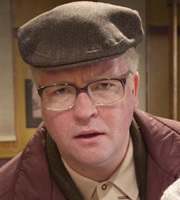- Welcome to Cook'd and Bomb'd.
-
 Is this proof that AI has...
by Theoretical Dentist
Is this proof that AI has...
by Theoretical Dentist
[Today at 12:54:19 AM] -
 Fallout 4 free update coming...
by Mobius
Fallout 4 free update coming...
by Mobius
[Today at 12:49:57 AM] -
 watching The Sopranos for...
by Memorex MP3
watching The Sopranos for...
by Memorex MP3
[Today at 12:48:41 AM] -
 Obnoxiously American words...
by Found Wound Round
Obnoxiously American words...
by Found Wound Round
[Today at 12:47:49 AM] -
 Load of horses gone mental...
by Dex Sawash
Load of horses gone mental...
by Dex Sawash
[Today at 12:45:11 AM] -
 Space Ghost Coast to Coast...
by Ferris
Space Ghost Coast to Coast...
by Ferris
[Today at 12:32:06 AM] -
 Swimming
by imitationleather
Swimming
by imitationleather
[Today at 12:31:28 AM] -
 Don't
by Sebastian Cobb
Don't
by Sebastian Cobb
[Today at 12:27:14 AM] -
 Terry & June gets a content...
by imitationleather
Terry & June gets a content...
by imitationleather
[Today at 12:26:01 AM] -
 The Captain Tom grift continues...
by Cold Meat Platter
The Captain Tom grift continues...
by Cold Meat Platter
[Today at 12:22:47 AM]
Members
 Total Members: 17,826
Total Members: 17,826 Latest: skinnylike
Latest: skinnylike
Stats
 Total Posts: 5,584,317
Total Posts: 5,584,317 Total Topics: 106,753
Total Topics: 106,753 Online Today: 902
Online Today: 902 Online Ever: 3,311
Online Ever: 3,311- (July 08, 2021, 03:14:41 AM)
Users Online
 Users: 51
Users: 51 Guests: 854
Guests: 854 Total: 905
Total: 905 EOLAN
EOLAN Theotherside
Theotherside KaraokeDragon
KaraokeDragon Found Wound Round
Found Wound Round dinglebonce
dinglebonce pupshaw
pupshaw pancreas
pancreas ros vulgaris
ros vulgaris Goldentony
Goldentony you stole my goddam house
you stole my goddam house Theoretical Dentist
Theoretical Dentist Ascent
Ascent daf
daf Cold Meat Platter
Cold Meat Platter EggsLikeABird
EggsLikeABird Starlit
Starlit Midas
Midas JimminyJillikers
JimminyJillikers Stoneage Dinosaurs
Stoneage Dinosaurs Brundle-Fly
Brundle-Fly klaatu!
klaatu! Dog Botherer
Dog Botherer Mobius
Mobius matjam13
matjam13 Poirots BigGarlickyCorpse
Poirots BigGarlickyCorpse Memorex MP3
Memorex MP3 McDead
McDead Wullie’s Pal
Wullie’s Pal Fishfinger
Fishfinger McChesney Duntz
McChesney Duntz Better Midlands
Better Midlands Sonny_Jim
Sonny_Jim Lenni
Lenni Dex Sawash
Dex Sawash SebastianDeath
SebastianDeath famethrowa
famethrowa convulsivespace
convulsivespace MrMealDeal
MrMealDeal Frank Wank
Frank Wank non capisco
non capisco
User actions

